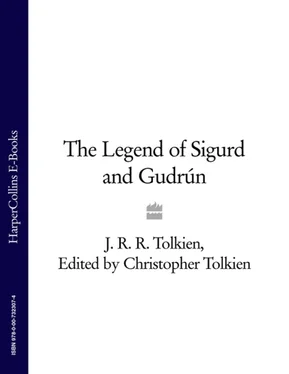J. Tolkien - The Legend of Sigurd and Gudrún
Здесь есть возможность читать онлайн «J. Tolkien - The Legend of Sigurd and Gudrún» — ознакомительный отрывок электронной книги совершенно бесплатно, а после прочтения отрывка купить полную версию. В некоторых случаях можно слушать аудио, скачать через торрент в формате fb2 и присутствует краткое содержание. Жанр: Старинная литература, на английском языке. Описание произведения, (предисловие) а так же отзывы посетителей доступны на портале библиотеки ЛибКат.
- Название:The Legend of Sigurd and Gudrún
- Автор:
- Жанр:
- Год:неизвестен
- ISBN:нет данных
- Рейтинг книги:5 / 5. Голосов: 1
-
Избранное:Добавить в избранное
- Отзывы:
-
Ваша оценка:
- 100
- 1
- 2
- 3
- 4
- 5
The Legend of Sigurd and Gudrún: краткое содержание, описание и аннотация
Предлагаем к чтению аннотацию, описание, краткое содержание или предисловие (зависит от того, что написал сам автор книги «The Legend of Sigurd and Gudrún»). Если вы не нашли необходимую информацию о книге — напишите в комментариях, мы постараемся отыскать её.
The Legend of Sigurd and Gudrún — читать онлайн ознакомительный отрывок
Ниже представлен текст книги, разбитый по страницам. Система сохранения места последней прочитанной страницы, позволяет с удобством читать онлайн бесплатно книгу «The Legend of Sigurd and Gudrún», без необходимости каждый раз заново искать на чём Вы остановились. Поставьте закладку, и сможете в любой момент перейти на страницу, на которой закончили чтение.
Интервал:
Закладка:
120 ‘Of his troll’s temper / yet true were the words!’ Atli refers, I believe, to Gunnar’s words (118) concerning Högni and the gold: ‘to his latest breath / he will loose it not.’
122 ‘Woe worth the wiles’: A curse on the wiles; cf. ‘Woe worth the while’ in the Lay of the Völsungs IX.29 and note.
124 ‘liever’: more acceptable.
128–130 In Atlakviða , when they brought the heart of Högni to Gunnar, he declared that ‘Always I had a doubt, while two of us lived; but now I have none, since I alone am living. The Rhine shall possess the gold that stirs men to strife, the Niflungs’ inheritance. In the rolling water shall the fatal rings gleam, rather than that gold should shine on the hands of the sons of the Huns.’
The actual casting of the gold into the Rhine is not referred to in Atlakviða (as it is in the Lay, 130, line 5, ‘in the deeps we cast it’), and this led to the contention that Gunnar meant no more than that he would rather see the hoard drowned in the Rhine than adorning the Huns. My father strongly rejected this, on several grounds: the syntax of the passage; the statement by Snorri Sturluson in the Prose Edda that ‘before they [Gunnar and Högni] departed from their land they concealed the gold, the heritage of Fáfnir, in the Rhine river, and that gold has never since been found’; and the references in the Nibelungenlied to the sinking of the treasure in the Rhine. He thought it probable that it was already part of the legend when it came North.
He noted also that the answer to the question, if the treasure was in the Rhine, what would it matter whether Högni were alive or dead, must be that Högni was the only party to the secret of where in the great river it lay; so in the Völsunga Saga Gunnar says: ‘And now I alone know where the gold is, and Högni will not tell you’, and Snorri’s ‘that gold has never since been found’. ‘Doubtless it could have been fished up,’ my father wrote, ‘if you knew just where to look.’ He believed nonetheless that the episode was a later elaboration (he called it ‘theatrical-dramatic’), not perfectly fitting with the Rhine-gold motive: see further the note to 148–150.
130 lines 5–8: compare the lines from near the end of Beowulf , 3166–8:
forleton eorla gestreon eorðan healdan,
gold on greote, þær hit nu gen lifað
ealdum swa unnyt, swa hit æror wæs.
They gave the ancient wealth to earth’s keeping,
under stone the gold, that there still dwelleth
as profitless to men as it proved of yore.
(From an alliterative translation by my father of Beowulf lines 3137–82.)
132–140 In Atlamál it is said, and it is repeated by Snorri, that Gunnar in the snake-pit played the harp with his feet, an idea that may have arisen from the observation that he was bound, as is told in Atlakviða (and in the Lay, 113). In the Lay, following Atlakviða , Gunnar used his hands. Other features of this episode in the Lay are derived from the Saga: that Gudrún sent him the harp (135), that his playing put the serpents to sleep (136), and that he was finally stung to death by a huge adder (139).
141–147 The great funeral pyres are not in the Eddaic poems, but Gudrún’s revenge on Atli is told in both – the same hideous motive as appears in the Greek legend, told by Ovid in the Metamorphoses , of Procne, who for vengeance killed her own son Itys and gave his flesh to her husband, Tereus King of Thrace, to eat.
142 Lines 5–8 are repeated almost exactly from the first stanza of the poem, where they are used of the pyre of Sigurd and Brynhild.
148–50 I have said (p.312) that my father ‘tentatively interpreted the state of Atlakviða as the reworking of an earlier poem, a reworking that had then itself undergone “improvements”, additions, losses, and disarrangements’. He believed that both the ‘Högni-Hjalli episode’ (see note to 118–131) and Gudrún’s revenge on Atli through their own children were later elaborations by ‘the Atlakviða poet’ on the earlier poem that he was reworking.
This last section of Atlakviða , constantly difficult to interpret in the detail of its language, is not altogether intelligible at large, logically or psychologically. As it stands, Gudrún came to meet Atli when he returned from the murder of Gunnar in the snake-pit and welcomed him to the feast with a golden cup (cf. the Lay, stanza 145), brought drink and food to the assembled company, waited on Atli – and then declared with ghastly clarity what she had done and what they were doing. A great cry of horror and noise of weeping arose from the benches, but Gudrún did not weep: ‘she scattered gold, with red rings enriched the men of her household.... Atli unsuspecting had drunk himself bemused; weapons he had not, he was not ware of Gudrún’ (this last phrase is my father’s translation of a Norse verb of uncertain meaning here). Then follows Gudrún’s murder of Atli in his bed before she set the hall on fire.
‘Why the distribution of gold,’ my father wrote, ‘when no help or favour was needed by Gudrún, or could be expected by a declared murderess of princes? Why the foolishness of Atli not suspecting Gudrún?’
His tentative solution was to suppose that while the perishing of Atli’s son, or sons, may have been a very old part of the legend, it was not originally an essential part of Gudrún’s revenge. The form in which we here find it interwoven (he wrote) is certainly mainly a Norse development, and the end of a long process. It is probable that it was not present in the ‘original source’ of Atlakviða , and that its introduction and interweaving with the main theme of revenge was the work of the Atlakviða poet.
He supposed that in an earlier form the story would have moved, after the funeral feast, to the verse describing Gudrún’s gold-giving, which would in this case be naturally interpreted as her continuing the pretence of cheerfulness, and acceptance, distributing rich gifts to allay suspicion. Then Atli, ‘unsuspecting’ – because he had no reason for suspicion – went to his bed very drunk (this being one of the oldest elements in the whole story, see Appendix A, pp.345–46). But when the motive of the murdered children entered it had necessarily to be introduced in the course of the funeral feast. The stanzas referred to above were retained, but they were not successfully fitted to the insertion (‘Why the distribution of gold? Why the foolishness of Atli?’).
In his Lay of Gudrún my father devised a remedy for this in Atli’s swoon of horror that caused the servants to carry him to his bed (148–149).
The author of Atlamál here suddenly turns to a tradition that Högni had a son who avenged him on Atli, and says (followed by the Saga, and by Snorri) that this son, who has not been previously mentioned in the poem, aided Gudrún in the murder. As is to be expected, this has no place in the Lay of Gudrún.
152–154 The burning of the hall by Gudrún is derived from Atlakviða : see note to 93–112.
156 Lines 5–8 are almost the same as the last lines of the Lay of the Völsungs (IX.82), and become also the last lines of the Lay of Gudrún (stanza 165) before the parting words of the poet to his audience.
157–165 In a pencilled note on the manuscript my father wrote that all the conclusion of the poem from stanza 157 should be omitted, only the final stanza 166 being retained. Rough lines drawn on the manuscript, however, show the omission as extending only to stanza 164, so that the last four lines of 156 are the same as the last four lines of 165 immediately following.
159–165 The verses given to Gudrún as she sits beside the sea are inspired by the late Eddaic poem Guðrúnarhvöt , but there is little close correspondence. The latter part of that brief lay is one of several ‘Laments of Gudrún’; but it includes her grief over the final element in the Northern legend, which for his purposes in these poems my father excluded.
Читать дальшеИнтервал:
Закладка:
Похожие книги на «The Legend of Sigurd and Gudrún»
Представляем Вашему вниманию похожие книги на «The Legend of Sigurd and Gudrún» списком для выбора. Мы отобрали схожую по названию и смыслу литературу в надежде предоставить читателям больше вариантов отыскать новые, интересные, ещё непрочитанные произведения.
Обсуждение, отзывы о книге «The Legend of Sigurd and Gudrún» и просто собственные мнения читателей. Оставьте ваши комментарии, напишите, что Вы думаете о произведении, его смысле или главных героях. Укажите что конкретно понравилось, а что нет, и почему Вы так считаете.












